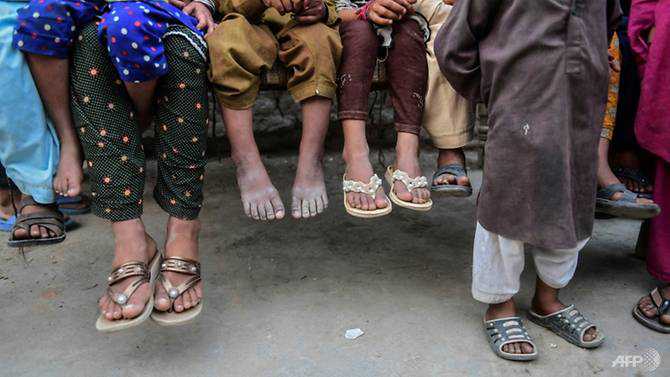Children pay the price in Pakistan's mass HIV outbreak
14 June, 2021

Since his son was identified as having HIV during a mass outbreak in Pakistan among babies and children, hard-up Shahzado Shar has often been forced to select between food and medicine.
His five-year-old was among hundreds who tested positive in 2019 after a whistleblower doctor uncovered a scandal relating to the re-use of needles in southern Sindh province.
The number of patients quickly swelled and 2 yrs later the figure stands at a lot more than 1,500, according to data from the provincial health ministry.
Pakistan's greatest HIV testing and treatment centre was established in the rural town of Rota Dero in the wake of the disaster, dishing out life-saving anti-retroviral drugs.
But damaged families must cover further costs due to the illness themselves.
"They reveal to go for further tests in private hospitals, but we don't have satisfactory money," Shar told AFP, describing how his son continues to have problems with regular fever, stomach and kidney pain.
Around 30 other children are also HIV positive within their small village of Subhani Shar, simply a few kilometres from Rato Dero.
Pakistan's public hospitals, located largely in cities, tend to be chaotic and inefficient, leaving rural families to rely on private clinics they are able to seldom afford that tend to be filled with unlicensed doctors.
Over 1,500 HIV cases have been uncovered in a tiny town in Pakistan's southern Sindh province following the widespread re-use of needles in 2019. (Photo: AFP/Asif HASSAN)
At least 50 children have died given that they were diagnosed, said paediatric specialist Fatima Mir, from Aga Khan University in Karachi, who has analysed the info - though she had expected the number to be higher given the malnutrition and poverty among families in the area.
Authorities blamed a single physician - a favorite child consultant in Rato Dero - for triggering the outbreak.
Muzaffar Ghangro is currently out on bail, with court hearings repeatedly pushed back, much to the anger of several families.
He denies the charges laid against him, saying other doctors have pinned the outbreak on him because of his successful practice.
'RUTHLESS' MALPRACTICE
Poor infection control is rife across impoverished Pakistan, where doctors often re-use equipment to spend less - out of necessity or greed.
The physician who first exposed Sindh's dirty needle scandal says little has changed since 2019.
"Things are as bad because they were during the outbreak," said whistleblower Imran Akbar Arbani, who called malpractice in the country "ruthless".
Arbani took his data on the outbreak to local media after discovering an alarming number of babies with HIV in Rato Dero, where he has a private clinic.
He said authorities were quick to react at that time, but that discipline has since slipped.
"In the first three months, quacks and unauthorised medical practitioners were banned and their clinics were sealed, nevertheless they obtained clearance later on," he said.
Rafiq Khanani, a health care provider and the president of the Infectious Diseases Society of Pakistan, said regulations were ineffective or routinely ignored.
"The regulatory departments exist only on documents and in offices... practically, they are ineffective."
In the wake of the scandal, the federal government banned the import of conventional syringes, insisting only on single-use auto-lock needles which can't be re-deployed.
But a Sindh health official who didn't desire to be named told AFP that lots of doctors were circumventing the ban but still purchasing the cheaper models.
'WE ARE DOOMED'
At Rato Dero's HIV testing and treatment centre, patients sit facing a television set screen churning out healthcare advice in the local Sindhi language.
A frail 20-year-old man sits silently with his father, looking forward to the results of rapid HIV test.
Paediatric consultant Fatima Mir said successful mass testing helped to identify victims of the crisis and decelerate onward transmissions.
But Pakistan now must go beyond the vital antiretrovirals and offer more rounded care to patients, Ayesha Isani Majeed, the top of the government's National AIDS Control Programme, told AFP.
As sunlight sets in Subhani Shar, a mother sits with her daughter draped across her lap, suffering another bout of fever.
Hakima Shar says she sometimes forgets to manage the drugs - that may control the virus and assist in preventing onward transmission - to her four-year-old, who often won't take them.
"We are extremely poor ... I awaken with the sun and start working, so who else will give her the medicine regularly?" said the 25-year-old mother, who in addition has contracted the virus.
Many families had never heard about HIV, however now it dominates their lives.
"The federal government doesn't provide us with antibiotics or multivitamins and we can't afford to buy them ourselves," she said.
"We are doomed."
Source:
